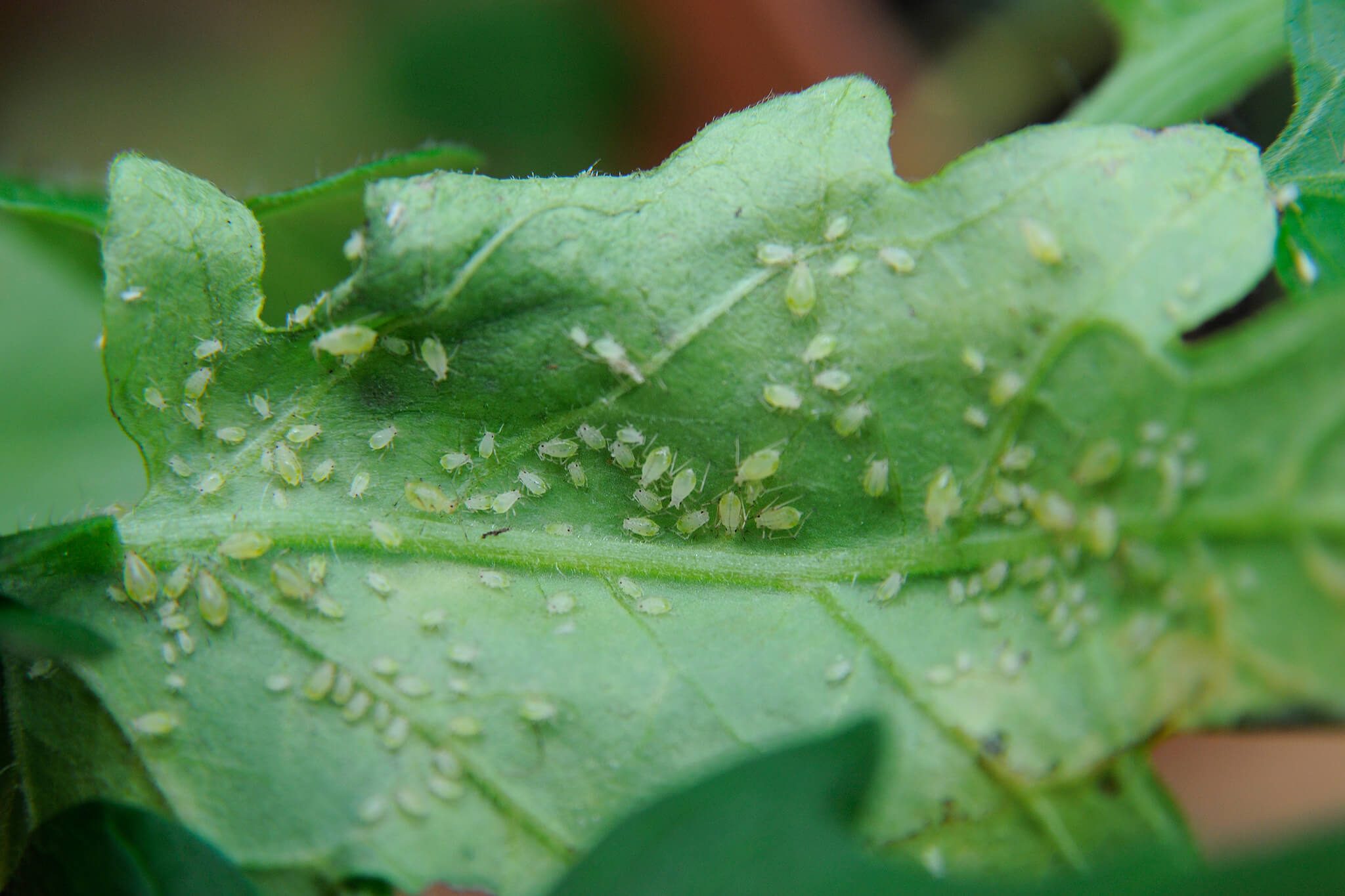Aphids are not only annoying but they can also be harmful to your plants.
They can cause all sorts of problems like spreading plant diseases, making flowers shrivel up and die, or even destroying fruit on trees.
Getting rid of them is a difficult task, but luckily there are several natural remedies you can try that won’t require you to use pesticides. If those don’t work, then you might want to consider using stronger chemicals on your plants.
In this article, we’ll tell you everything you need to know about aphids – including how to get rid of them – so you can keep your plants healthy and aphid-free.
What are Aphids?
Aphids are small, soft-bodied insects that feed on the sap of plants.

Image Credit: http://gardendesign.com
Image Credit: http://gardendesign.com
They come in many different colors, including red, green, black, and white, and can be found all over the world.
Aphids can cause a lot of damage to plants by sucking the sap out of them which can lead to problems like stunted growth, distorted leaves, and even death.
How do I get rid of aphids?
Similar togetting rid of flies, there are a few ways you can get rid of aphids naturally without using pesticides. Keeping them away in the first place is much easier than killing them.
Here are some things you can do to help your plants stay aphid-free:
One way is to use insecticidal soap or neem oil. Insecticidal soap is a soap that kills insects by attacking their outer shell. Water plants sparingly. A good way to do this is by using a soaker hose instead of a sprinkler, as they let the water go straight onto the soil and through to the roots where it’s needed most.Don’t overfeed your plants. Aphids thrive on excess nitrogen from fertilizers which causes fast growth in plants. So make sure you’re only feeding your plants as much as they need. If you’re not sure how much food to give them, use an organic fertilizer like worm castings or compost tea every few weeks during active growth (spring and summer). Make sure your plants get enough sunlight. Sunlight is a naturally effective aphid repellent, so it makes sense that plants that don’t get enough won’t be able to fight them off. This means not over-planting and making sure your plants aren’t overcrowded in their pot.Another natural way of getting rid of aphids is using insecticidal soap or neem oil. Insecticidal soap attacks their outer shell while neem oil suffocates them.Finally, you can use a garden hose sprayer to blast the aphids right off your plant’s leaves. Aphids are tiny and light so they’ll blow away in the wind when sprayed with water. Just make sure you’re using water that is warm enough to dissolve the soap or neem oil you want to use.
Going for stronger measures
If natural methods don’t work, you might want to consider using stronger chemicals on your plants.
Pesticides and systemic insecticides are two options that can be effective in getting rid of aphids, but you should only use them if you have a serious infestation.
Measure to take if using insecticides:
Remove any affected plants from the area and discard them in the trash.Put on protective clothing, including long pants, a long-sleeved shirt, shoes and socks, and chemical-resistant gloves.Make sure to cover your hair, too.Mix the insecticide according to the instructions on the label.Spray the insecticide directly onto the aphids using a handheld sprayer.Reapply as needed, but be careful not to overuse or you could damage your plants.
If you’re considering using a systemic insecticide, it’s important to read the label carefully first and follow all of the instructions. Systemic insecticides are absorbed by the plant’s roots and then move throughout the plant, killing any aphids that are feeding on it.
They are a more effective treatment than contact insecticides, but they also come with a higher risk of harming your plants. Make sure you only use them if you really need to and always test a small area first to make sure the insecticide won’t harm your plants.
Also, be sure to read the label carefully before applying any pesticides or insecticides to your plants.
Other considerations to get rid of aphids
When getting rid of aphids, you should also take into account the environment and other living creatures in your garden.
Many natural predators of aphids, such as ladybugs and lacewings, can help keep populations under control. You can encourage these predators by planting flowers that attract them, like yarrow, cosmos, or dill.

Image Credit: http://gardenersworld.com
You can also buy predatory insects from a garden center or online.
If you’re using a pesticide or systemic insecticide to get rid of aphids, make sure it won’t harm any of the predators in your garden.
And finally, always be careful when using any type of chemical in your garden. Follow all of the instructions carefully, wear protective clothing, and avoid getting the chemical on your skin or in your eyes.
How To Get Rid Of Aphids – FAQ
What are aphids?
Aphids are small, soft-bodied insects that typically measure 1/8 to 1/4 inch in length. They can be green, black, or red, and often have a pair of antennae protruding from their head. Aphids are sap-sucking pests that feed on the leaves of plants and can cause extensive damage to crops if left untreated.
What are some common methods for getting rid of aphids?
There are several different methods for getting rid of aphids, including physical removal, horticultural oil sprays, and insecticidal soap.
Physical removal is probably the simplest method for getting rid of aphids. This involves manually picking them off of the plants with your hands, or using a garden hose to spray them off.
Horticultural oil sprays are another option for getting rid of aphids. These sprays are made from plant-based oils and work by suffocating the insects. They can be used as a preventative measure or to treat an existing infestation.
Insecticidal soap is a chemical spray that is effective at killing aphids. It is made from potassium salts of fatty acids and works by breaking down the outer layer of the aphid’s exoskeleton. Insecticidal soap is safe to use on most plants, but should not be used on edible crops.
What if natural methods don’t work to get rid of aphids?
If you are unsuccessful at ridding your plants of aphids using these methods, there are a few other options available to you. One option is neem oil, which is an organic pesticide made from the seeds of the neem tree. This product is effective against aphids, but may not be safe for all types of plants or crops.
Another option is the pyrethrum, which comes from chrysanthemums and kills aphids by disrupting their nervous system. Pyrethrum can be used on most plant varieties and crops, but it may need to be reapplied after heavy rainfall or watering of the plants.
Finally, try an insecticidal soap spray with added rosemary oil; this may provide some extra protection against aphids, and rosemary oil has been shown to boost the effectiveness of insecticidal soap. It’s also good to know that these methods can be used toget rid of ants and other annoying creatures.
When is the best time to treat aphids?
There isn’t any one “best” time of year to treat for aphids; this will depend upon your climate, local plant species, and various other factors. One thing you can do is look at the plants that are infested with aphids (and plan on treating them), and see if they’ve ever been treated in the past. If they haven’t been treated before, then try treating them now while they are still small. That way, you have a better chance of successfully ridding them of their pesky invaders.
Final thoughts on how to get rid of aphids
Aphids can be a real nuisance in the garden, but there are many ways to get rid of them. Using natural methods, like providing enough sunlight and food, is often the best way to go. If those methods don’t work, you can try using insecticidal soap or neem oil. And if you need to, you can use a pesticide or systemic insecticide, but be careful to follow all of the instructions and take into consideration the environment and other living creatures in your garden. Happy gardening.
The post How To Get Rid Of Aphids appeared first on Kitchen Infinity.
Did you miss our previous article…
https://www.centrecountyfood.org/?p=697